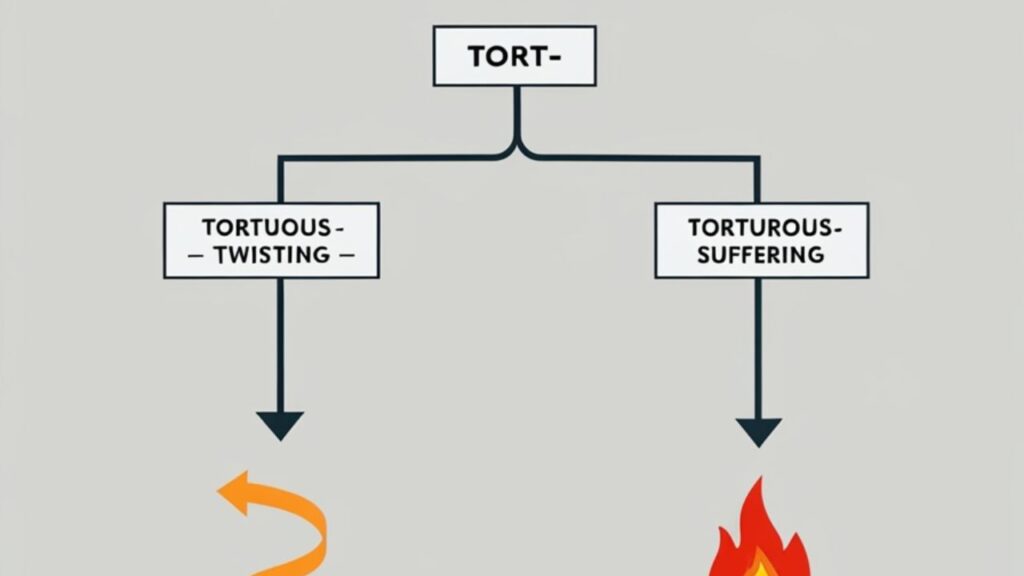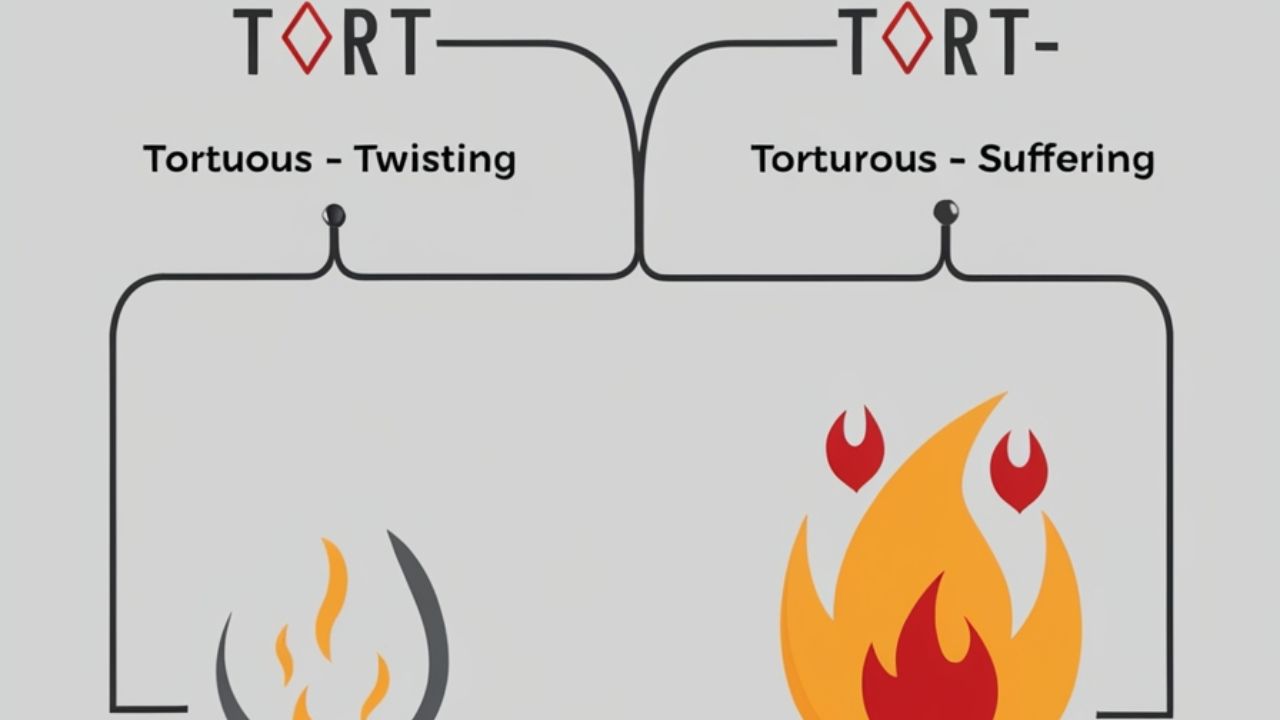A tortuous road has many twists and turns. It moves like a snake, full of bends that make travel slow and tricky. People use this word when something feels long, winding, or hard to follow, such as a curvy path or a confusing story.
A torturous moment brings deep pain or strong suffering. It may describe physical hurt or emotional sadness. For example, a long wait for help or an illness can feel torturous because it causes great discomfort and stress.
Both words look alike but mean different things. One talks about shapes or paths that twist, while the other speaks about pain. Learning their meanings helps writing sound clear, correct, and easy to understand.
Understanding “Tortuous”: Origins and Meaning
The word tortuous comes from old Latin, meaning something that twists or winds. It tells about things that bend or turn many times, like a curly road or a tangled river. Writers use it to show movement that isn’t straight or simple.
A tortuous path or idea can feel tricky and full of turns. It often shows a way that takes longer to reach the end. People use it for roads, thoughts, or plans that move around instead of going in a straight line.
- The word tortuous comes from the Latin word tortus, meaning “twisted” or “winding.”
- It describes something that bends or turns many times, like a snake or curved road.
- People use it to talk about tricky paths, hard journeys, or confusing ideas.
- It helps show when something isn’t straight or simple but full of changes.
- Writers use tortuous to make descriptions clear, showing how difficult or twisting something feels.
| Word | Origin | Meaning in Latin | Modern Usage |
| Tortuous | Latin tortus | Twisted, twisted shape | Winding, complex, indirect |
When to Use “Tortuous”: Clear Examples
The word tortuous fits well when something moves in a curvy or difficult way. It can describe a long mountain road, a twisting river, or even a tricky plan. It helps readers see movement that turns many times before reaching the goal.
Writers also use tortuous to show ideas that feel complex or hard to follow. It can describe speeches, stories, or processes that take many steps. This word makes writing sound clear and helps explain anything that bends, loops, or changes direction often.
- Use tortuous for roads or paths that twist and turn many times, like a mountain trail.
- It can describe a river that bends or curves before reaching the sea.
- Use it for complex ideas or explanations that are hard to follow.
- It fits situations or plans that take many steps or changes to finish.
- Writers use tortuous to show something long, winding, or full of obstacles.
See also Chateaus vs Chateaux: Meaning, Usage & Real Difference
Examples in Sentences
| Sentence | Context |
| “The lawyer’s tortuous arguments puzzled the jury.” | Legal/Communication |
| “The river followed a tortuous course through the valley.” | Geography |
| “She gave a tortuous answer that avoided the question.” | Social interaction |
Exploring “Torturous”: Definition and Usage

The word torturous explains something that causes great pain or deep sadness. It comes from the word “torture,” meaning strong suffering. People use it when they feel hurt inside or outside, like during sickness, heartbreak, or extreme discomfort that feels too hard to bear.
A torturous experience can also describe long or tiring situations. It may be a tough exam, a hard journey, or a painful memory. This word helps to express emotions clearly, showing how something feels truly harsh or unbearable for a person.
What Does Torturous Mean?
The word torturous means something that brings strong pain or suffering. It may describe hard times that hurt the body or mind. People use it for moments filled with struggle, discomfort, or deep sadness that feels impossible to forget or escape.
A torturous day or event can feel long and unbearable. It might involve heavy work, illness, or emotional stress. This word helps explain experiences that cause hurt or distress, showing how deeply someone feels pain in a clear and simple way.
- The word torturous means something that causes strong pain or great suffering.
- It can describe physical hurt, like an injury, or emotional pain, like sadness.
- People use it for hard experiences that feel endless or unbearable.
- It shows deep discomfort, stress, or struggle in life or stories.
- Writers use torturous to express feelings of agony, hardship, or distress clearly.
Examples of Torturous in Use
| Sentence | Context |
| “The patient described the torturous pain in his leg.” | Medical |
| “It was a torturous wait for the test results.” | Emotional stress |
| “Surviving the desert was a torturous ordeal.” | Physical hardship |
Recognizing “Torturous” in Real Life and Language
The word torturous appears in real life when something feels painfully slow or hard. It might describe a long exam, a severe illness, or an emotional struggle. People use it to share feelings of hurt, showing deep discomfort that lasts for a while.
Writers often choose torturous to make strong emotions clear. It helps describe moments of intense pain or sadness in stories and real situations. The word gives a sense of deep struggle, letting readers understand how much someone truly suffers inside.
Common Confusions Between “Tortuous” and “Torturous”
- Both words start with “tort,” which makes them look and sound almost the same.
- Tortuous means twisting or winding, while torturous means painful or full of suffering.
- Many people mix them up because of their close spelling and pronunciation.
- Media and casual speech often use one in place of the other by mistake.
- Remember: tortuous is about curves and complexity, torturous is about pain and hardship.
How to Tell Them Apart
| Feature | Tortuous | Torturous |
| Meaning | Twisting, winding, complex | Painful, agonizing, causing suffering |
| Use Case | Describing paths, speech, processes | Describing pain, suffering, hardship |
| Tone | Neutral, descriptive | Emotional, intense |
| Example | A tortuous path | A torturous injury |
Cultural and Media Influences on Misuse
- Movies and TV shows often use tortuous when they really mean torturous, causing confusion.
- News articles and blogs sometimes repeat these errors, spreading the wrong meaning further.
- Song lyrics or dramatic scenes mix the words to sound emotional, not accurate.
- Over time, people start believing both words mean the same because they hear them misused.
- Learning the true meanings helps avoid mistakes and keeps language clear in daily life.
See also Who Else or Whom Else: What’s the Real Grammar Rule?
The Overlap: When “Tortuous” and “Torturous” Both Apply
- Sometimes, both words fit when something is complex and painful at the same time.
- A long legal battle can be tortuous for its twists and torturous for its stress.
- A difficult journey may twist through mountains and also cause great exhaustion.
- Both meanings connect when a situation brings confusion and suffering together.
- Choosing the right word depends on whether you want to show pain or complexity more.
Contextual Clues for Choosing Correct Usage
- Look at what the sentence describes — a shape or feeling helps guide the choice.
- Use tortuous when something twists, turns, or feels complicated and winding.
- Choose torturous when it shows pain, sadness, or emotional suffering.
- Think about the tone — tortuous sounds neutral, while torturous feels heavy and emotional.
- Reading the full sentence carefully helps decide which word fits the meaning best.
Decision Checklist
- Describe a twisting road, river, or path → use tortuous.
- Talk about strong pain or emotional struggle → use torturous.
- Write about legal wrongdoing → use tortious.
- If both twisting and suffering appear, choose the clearer meaning.
- Always reread the sentence to check that the word fits naturally.
Brief Note on “Tortious”: Legal Term Clarified

Though not often confused with the other two in casual conversation, tortious is a legal term worth knowing. It comes from tort, meaning a wrongful act leading to legal liability.
What is Tortious?
- The word tortious comes from tort, which means a wrongful act in law.
- It describes actions that cause harm or injury to another person.
- Lawyers use it when someone breaks legal duties or behaves unfairly.
- Examples include negligence, defamation, or causing damage without reason.
- Tortious is only used in legal talk, not for pain or twisting paths.
Summary Table: Tortuous vs. Torturous vs. Tortious
The word tortuous means something that twists or turns many times, like a winding road. The word torturous shows pain or great suffering. The word tortious belongs to law and explains a wrongful act that causes harm to another person.
Each term has its own clear meaning. Tortuous shows curves or complexity, torturous expresses pain or hardship, and tortious belongs to legal talk. Knowing their differences helps in writing and speaking with care, accuracy, and confidence.
| Word | Meaning | Typical Usage | Origin | Notes |
| Tortuous | Twisting, winding, complex | Describing paths, speech, processes | Latin tortus | Neutral, descriptive |
| Torturous | Painful, agonizing | Describing physical/emotional pain | From torture | Emotional, intense |
| Tortious | Legal wrongful conduct | Used in legal contexts | From tort | Legal term, unrelated to pain |
Final Thoughts
Learning words like tortuous and torturous helps in using English correctly. One word talks about twists or curves, while the other shows pain or suffering. Understanding both makes writing stronger and helps express ideas clearly in every kind of sentence or story.
Knowing such words builds good language habits. It also improves reading and speaking skills. Using the right term at the right time shows care and knowledge. This practice keeps communication simple, correct, and full of meaning for everyone.
FAQs
Is a mountain road tortuous or torturous?
A mountain road is “tortuous,” meaning winding and full of twists, not “torturous,” which means causing pain.
What does tortuous mean?
“Tortuous” means full of bends, twists, or complicated turns—physically or figuratively.
What is an example of tortuous?
Example: “The hikers followed a tortuous path up the steep mountain.”
What does it mean to have a tortuous?
It means having something complex, winding, or difficult to navigate, like a tortuous route or process.

Join Bibcia on a journey to master English grammar. Discover easy lessons, writing tips, and practical examples designed to make learning grammar simple and effective.










